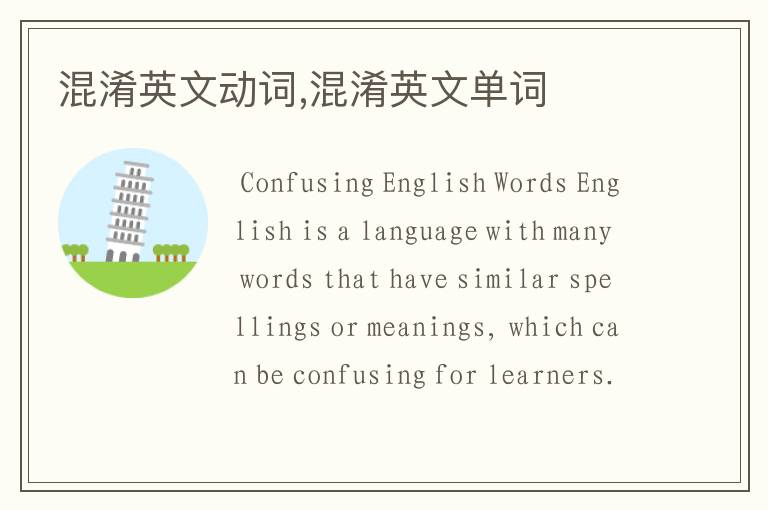
本篇文章给大家谈谈混淆英文动词,以及混淆英文单词对应的知识点,文章可能有点长,但是希望大家可以阅读完,增长自己的知识,最重要的是希望对各位有所帮助,可以解决了您的问题,不要忘了收藏本站喔。

Confusing English Words
English is a language with many words that have similar spellings or meanings, which can be confusing for learners. Here are some commonly confused words and their differences:
1. Accept vs Except
Accept means to receive or agree to something, while except means to exclude or leave out. For example, "I accept your apology" vs "Everyone except John is coming to the party."
2. Affect vs Effect
Affect is a verb meaning to influence or change, while effect is a noun meaning the result or consequence of something. For example, "The rain affected the game" vs "The effect of the rain was a delay in the game."
3. Allusion vs Illusion
An allusion is a reference to something else, while an illusion is a false perception or belief. For example, "The author made an allusion to Shakespeare in the novel" vs "The magician created an illusion of a disappearing rabbit."
4. Compliment vs Complement
A compliment is a kind or flattering remark, while a complement is something that completes or enhances something else. For example, "She gave me a compliment on my dress" vs "The red shoes complemented the outfit."
5. Desert vs Dessert
Desert refers to a dry, barren area, while dessert is a sweet dish served after a meal. For example, "The Sahara desert is very hot" vs "I ordered chocolate cake for dessert."
6. Discreet vs Discrete
Discreet means to be careful or tactful in behavior, while discrete means to be separate or distinct. For example, "He was discreet in his handling of the situation" vs "The data was divided into discrete categories."
7. Emigrate vs Immigrate
Emigrate means to leave one's country to live in another, while immigrate means to enter a new country to live permanently. For example, "My grandparents emigrated from Italy to America" vs "My friend immigrated to Canada from China."
8. Lend vs Borrow
Lend means to give something to someone for a temporary period, while borrow means to take something from someone for a temporary period. For example, "Can you lend me your pen" vs "I need to borrow your book."
9. Principal vs Principle
Principal refers to the head of a school or a sum of money invested, while principle refers to a fundamental belief or rule. For example, "The principal of the school greeted the students" vs "I believe in the principle of honesty."
10. Stationary vs Stationery
Stationary means not moving or still, while stationery refers to paper and other materials used for writing. For example, "The car was stationary at the traffic light" vs "I bought some new stationery for my office."
In summary, English has many words that can be easily confused. However, by understanding their differences, learners can improve their communication skills and avoid common mistakes.
好了,文章到这里就结束啦,如果本次分享的混淆英文动词和混淆英文单词问题对您有所帮助,还望关注下本站哦!
上一篇:baidu翻译,百度翻译句法分析
下一篇:关于祈祷英文的一些信息
Copyright © 2021-2022 七星号-(www.ccd-17.com) 版权所有
